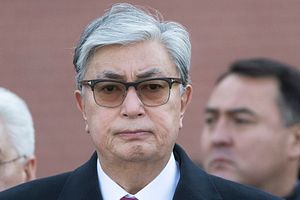Trans-Pacific View author Mercy Kuo regularly engages subject-matter experts, policy practitioners, and strategic thinkers across the globe for their diverse insights into U.S. Asia policy. This conversation with George Voloshin – head of the French branch of Aperio, a corporate risk intelligence consultancy in Paris, and author of The European Union’s Normative Power in Central Asia: Promoting Values and Defending Interests – is the 193rd in “The Trans-Pacific View Insight Series.”
Describe the stance of the newly elected President Tokayev toward the United States and U.S. engagement with Kazakhstan.
Kassym-Jomart Tokayev is Kazakhstan’s best known diplomat, having served as foreign minister from 1994 to 1999 and again from 2002 to 2007. He later served as director general of the UN Office at Geneva. Throughout his diplomatic work, he has embodied Kazakhstan’s strategic commitment to a multivector foreign policy that consists in the cultivation of equally friendly and mutually beneficial relationships with various centers of power, such as Russia, China, the U.S., Europe, Turkey, and the Gulf. There is no doubt that he remains personally committed as president to the pursuit of a productive working dialogue with the U.S. government. In this respect, it is absolutely safe to expect the same level of engagement with the U.S. as under his predecessor Nursultan Nazarbayev, who had a rather cordial meeting with Donald Trump in the White House in January 2018.
How will President Tokayev likely balance the U.S. vis-à-vis Russia and China?
For Kazakhstan and President Tokayev in particular, the multivector foreign policy which I just mentioned is the best guarantee of maintaining the right balance between the two closest neighbors, Russia and China, and the West, more specifically the U.S. We should always keep in mind that Russia and China will invariably continue to top the Kazakh foreign policy agenda, thanks to their historical and economic ties to Kazakhstan that surpass in depth and breadth whatever relations it has with other countries. A strong bilateral relationship with the U.S. should provide the new Tokayev administration with much-needed legitimacy throughout the Western world. Although Tokayev is not new to Kazakh politics and is well-known abroad, the former president Nursultan Nazarbayev still hovers behind his back. Tokayev’s ability to engage directly with the U.S. on a continuous basis – primarily on broad diplomatic and more narrow economic issues – will earn him additional recognition.
What strategic challenges and opportunities face Tokayev?
President Tokayev is presiding over a stagnating economy dogged by the lack of diversification, whereby crude oil remains Kazakhstan’s main export commodity and volatile oil prices largely determine domestic macroeconomic stability. The scale of protests that began with Nazarbayev’s resignation in March and escalated on election day, June 9, are the strongest-ever expression of the general striving for change. Tokayev has already laid out 10 priorities, which are heavily skewed toward socioeconomic improvements and also mention the fight against corruption as a fundamental policy area. His key challenge is the same that Kazakhstan has been facing since independence, albeit in much better economic conditions: How to wean the country off oil and make the non-oil economy really competitive, free from corruption and undue government interference ̶ in essence, the biggest challenge Tokayev is facing is how to do this while keeping the current political system mostly intact.
How will President Tokayev position Kazakhstan in Central Asia’s regional geopolitical dynamics?
As a former minister of foreign affairs, Tokayev continues to see Kazakhstan as Central Asia’s largest economy and its unrivaled investment magnet, as well as a linchpin of stability in an inherently fragile region. Relations among Central Asian states have been significantly improving since the death of Uzbek President Islam Karimov in 2016. In February 2018, Nazarbayev hosted a regional summit, the first in nine years. President Tokayev is just back from a trip to Tajikistan where he attended a high-level gathering of the Shanghai Cooperation Organization. I wouldn’t be surprised if he decided shortly to hold a second Central Asian summit in a bid to strengthen the budding strategic rapprochement. Tokayev ideally fits the role of a mediator on issues where contradictions still exist, namely between Kyrgyzstan, Tajikistan, and Uzbekistan. He is rightly considered a consensual figure who, with his proven diplomatic skills, can move the regional dialogue forward.
How should Washington engage Tokayev’s leadership?
During his post-election press conference, Tokayev said that he considered himself a full-fledged president and intended to serve a full term. He also asked the media to forget the word “succession,” which inevitably brings to mind his predecessor Nursultan Nazarbayev and makes the new president look almost insignificant. Although Tokaev does rely on Nazarbayev for advice on all strategic matters, he needs to be seen as a legitimate head of state. Since foreign policy under Tokayev is not at all different from what was the case under Nazarbayev, the U.S. government should pursue the same time-proven approach. A strong bilateral connection to be maintained at the highest possible level and mutually advantageous economic ties (e.g. U.S. companies remain actively involved in Kazakhstan’s key energy projects) will continue to form the basis of a successful relationship.
































